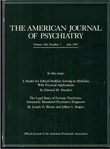An effect of pharmacotherapy on the psychoanalytic process: case report of a modified analysis
Abstract
A woman who had appeared suitable for psychoanalysis was persistently unable to develop an analyzable transference. Her history, as it unfolded during analysis, suggested a form of atypical depression linked to a neurochemical abnormality, which appeared to be related to her reluctance to take the emotional risk involved in examining transference phenomena. The analysis was modified by a trial of phenelzine. Changes within the analysis and in the patient's private life after the drug trial ended support the hypothesis that her affective vulnerability had inhibited her ability to engage in analysis of transference before the administration of the drug.
Access content
To read the fulltext, please use one of the options below to sign in or purchase access.- Personal login
- Institutional Login
- Sign in via OpenAthens
- Register for access
-
Please login/register if you wish to pair your device and check access availability.
Not a subscriber?
PsychiatryOnline subscription options offer access to the DSM-5 library, books, journals, CME, and patient resources. This all-in-one virtual library provides psychiatrists and mental health professionals with key resources for diagnosis, treatment, research, and professional development.
Need more help? PsychiatryOnline Customer Service may be reached by emailing [email protected] or by calling 800-368-5777 (in the U.S.) or 703-907-7322 (outside the U.S.).



